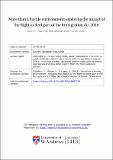Files in this item
More than a hostile environment : exploring the impact of the Right to Rent part of the Immigration Act 2016
Item metadata
| dc.contributor.author | Crawford, Joseph | |
| dc.contributor.author | McKee, Kim | |
| dc.contributor.author | Leahy, Sharon | |
| dc.date.accessioned | 2019-08-28T10:30:02Z | |
| dc.date.available | 2019-08-28T10:30:02Z | |
| dc.date.issued | 2019-08-23 | |
| dc.identifier | 259702338 | |
| dc.identifier | 7069ca5e-5598-4f9d-a8b4-fcfa3bc7f9b6 | |
| dc.identifier | 85071603001 | |
| dc.identifier | 000483338700001 | |
| dc.identifier.citation | Crawford , J , McKee , K & Leahy , S 2019 , ' More than a hostile environment : exploring the impact of the Right to Rent part of the Immigration Act 2016 ' , Sociological Research Online , vol. Online First . https://doi.org/10.1177/1360780419867708 | en |
| dc.identifier.issn | 1360-7804 | |
| dc.identifier.other | ORCID: /0000-0002-3611-569X/work/60887385 | |
| dc.identifier.uri | https://hdl.handle.net/10023/18384 | |
| dc.description.abstract | This article is based on original data from a qualitative study on the impact of the Right to Rent part of the Immigration Act 2016 in Scotland. Our findings show that in addition to being an integral part of the government’s project of creating a ‘hostile environment for immigrants’, the process of extending the state’s ‘law and order’ functions to organisations responsible for providing welfare services and distributing public goods is of wider political importance. Here, we argue that this process, what Bourdieu calls the rightward tilting of the bureaucratic field, results in widespread discrimination as it entails a shift in focus of its criminalising gaze from ‘conduct’ to ‘status’. The effects of this rightward shift altered the categories through which welfare services were both conceived and delivered more widely. We found that the almost universal opposition of the housing sector to the unwanted imposition of duties previously confined to border control agencies shows the extent to which the state is not a unitary monolith but is, rather, a site of perpetual struggle and contestation. By locating the perspective of housing professionals in relation to the government’s attempts to redraw the boundaries of the state’s own responsibility, we can gain a valuable insight into the processes of state crafting, which have wider implications beyond merely the creation of a hostile environment for immigrants. | |
| dc.format.extent | 18 | |
| dc.format.extent | 387991 | |
| dc.language.iso | eng | |
| dc.relation.ispartof | Sociological Research Online | en |
| dc.subject | Criminalisation | en |
| dc.subject | State crafting | en |
| dc.subject | Bureaucratic field | en |
| dc.subject | Housing | en |
| dc.subject | Immigration | en |
| dc.subject | HM Sociology | en |
| dc.subject | G Geography (General) | en |
| dc.subject | NDAS | en |
| dc.subject | SDG 10 - Reduced Inequalities | en |
| dc.subject.lcc | HM | en |
| dc.subject.lcc | G1 | en |
| dc.title | More than a hostile environment : exploring the impact of the Right to Rent part of the Immigration Act 2016 | en |
| dc.type | Journal article | en |
| dc.contributor.institution | University of St Andrews. School of Geography & Sustainable Development | en |
| dc.contributor.institution | University of St Andrews. Centre for Research into Equality, Diversity & Inclusion | en |
| dc.contributor.institution | University of St Andrews. Office of the Principal | en |
| dc.identifier.doi | https://doi.org/10.1177/1360780419867708 | |
| dc.description.status | Peer reviewed | en |
This item appears in the following Collection(s)
Items in the St Andrews Research Repository are protected by copyright, with all rights reserved, unless otherwise indicated.

